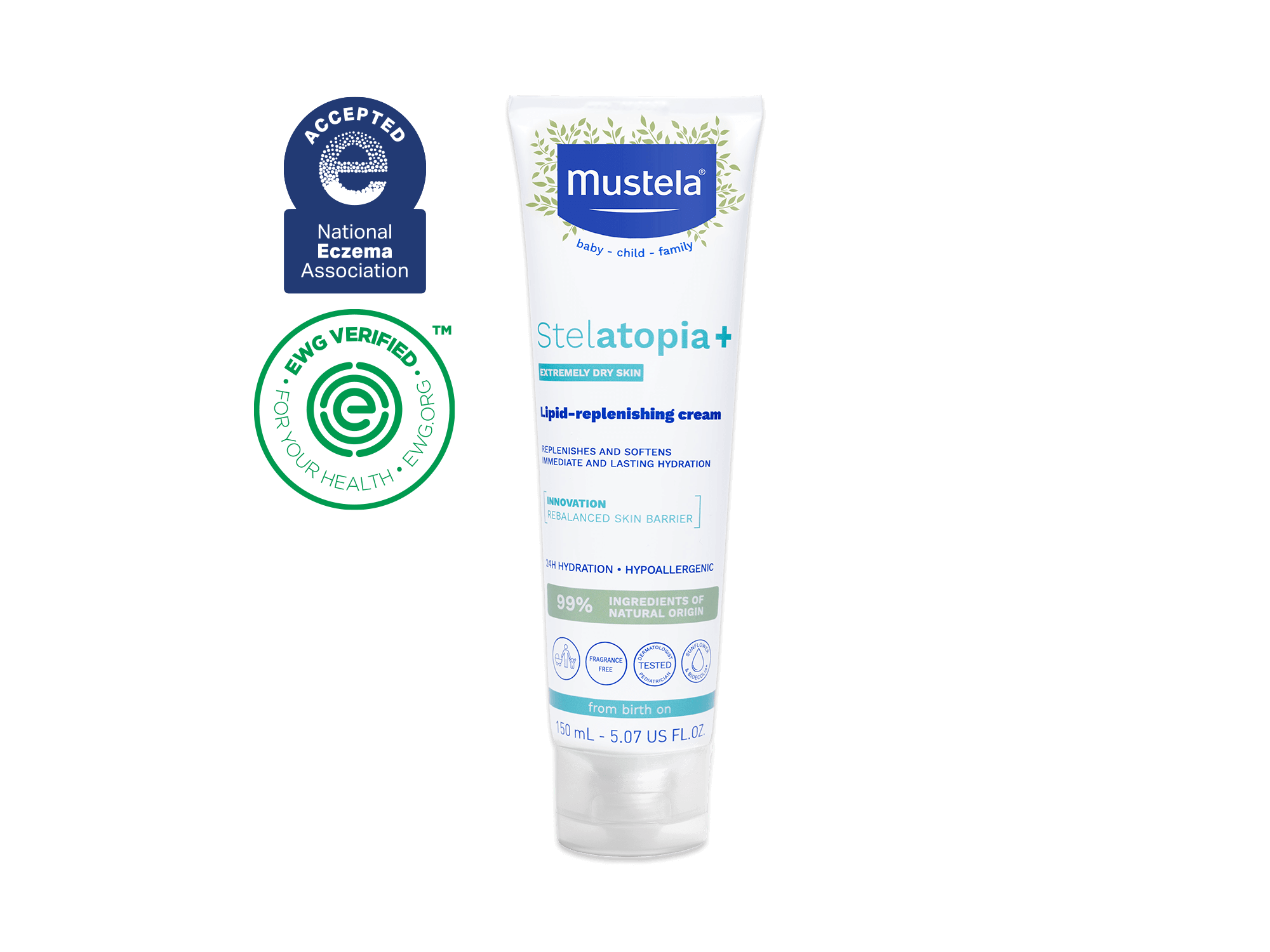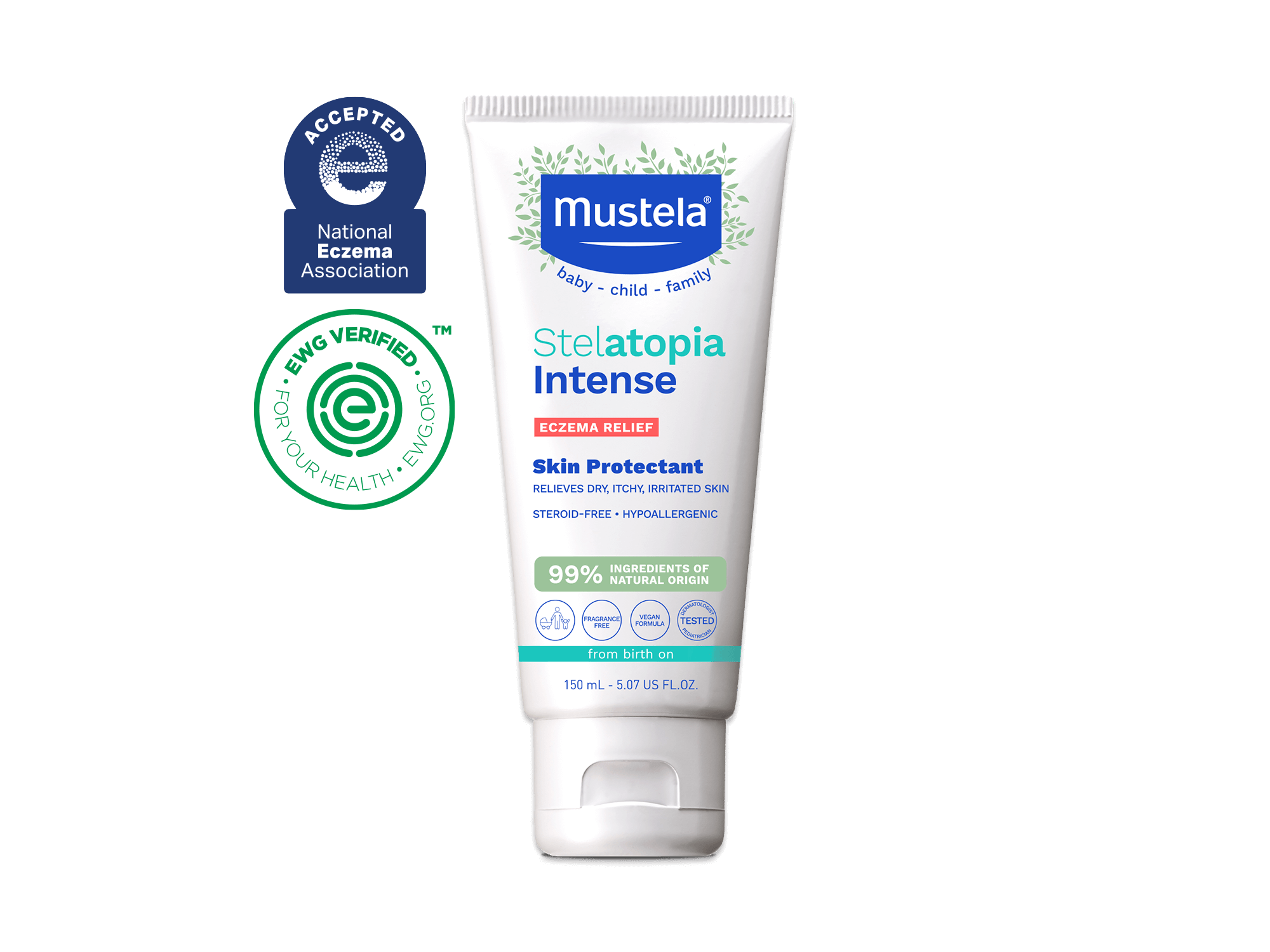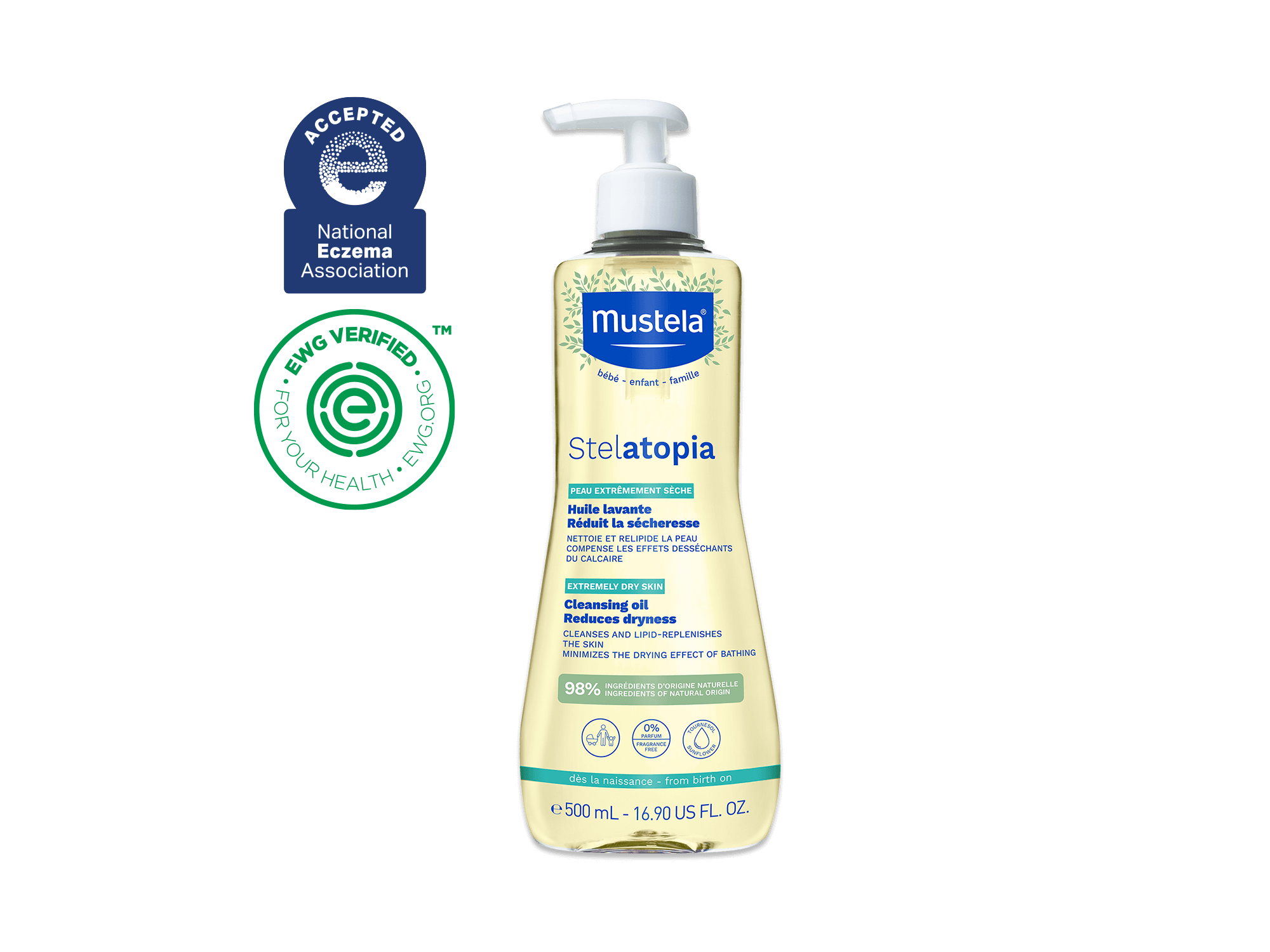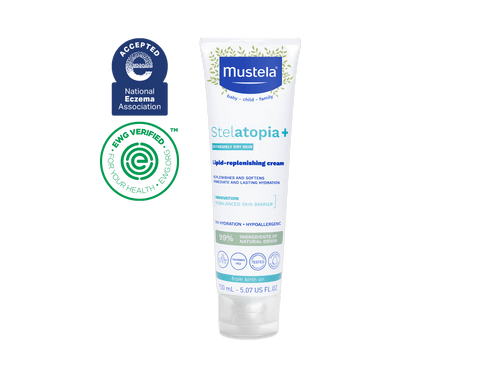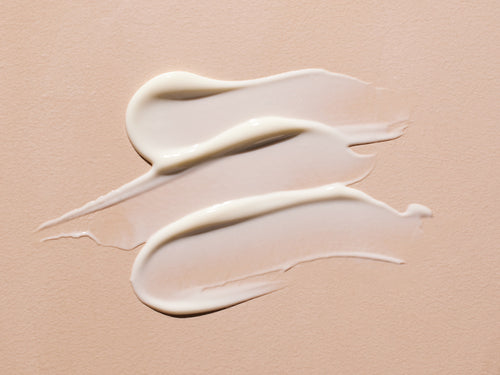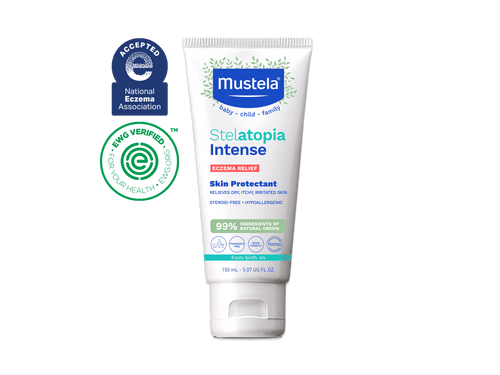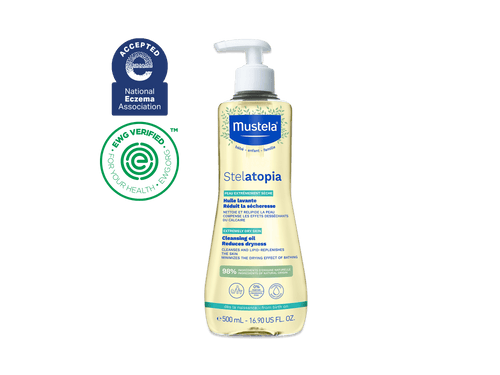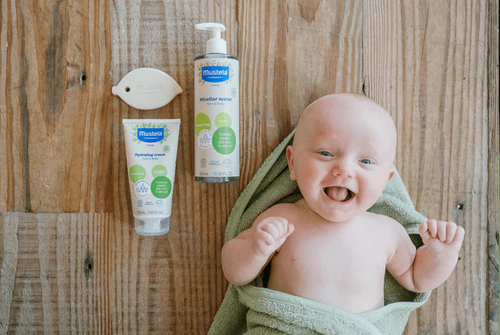When it comes to choosing a sunscreen for eczema-prone skin, we know you want your family to receive the best sun protection without causing irritation.
But selecting the right products to protect your little one’s eczema-prone skin can feel overwhelming! From cleansers to lotions and everything in-between, there are so many different products to try.
What are the key ingredients to look out for? What qualities should a great sunscreen have? And how can you ensure you’re providing the right type of sun protection for eczema-prone skin?
In this guide, we’ll explore what eczema is, how to manage it, and how to choose the best sunscreen for eczema that’s suitable for the whole family, from little ones to adults.
Table Of Contents
- What Is Eczema?
- Choosing Sunscreen For Eczema-Prone Skin
- Sunscreen For Eczema-Prone Skin: 3 Options
- Don’t Stop At Sunscreen
- Caring For Eczema-Prone Skin In The Summer
- Get Outdoors With The Right Sunscreen For Eczema!
What Is Eczema?

Eczema, also known as atopic dermatitis, is a genetic skin condition that causes the protective layer of your or your baby’s skin to become thin and break down. This allows much-needed moisture to escape, leaving skin vulnerable to contact with allergens.
While eczema can be very uncomfortable, thankfully, it’s not contagious, so there’s no need to worry about the potential for eczema to spread between yourself and your baby or between family members.
What Are The Symptoms Of Eczema?
Eczema is characterized by patches of dry, red skin that cause intense itching. You may even notice small blisters on your little one’s eczema-prone skin.
While the appearance of eczema is the same in infants and children as it is in adults, the location of eczema may change over time.
For example, up to six months of age, your little one’s eczema may appear mostly on the cheeks, forehead, and scalp. In older children and adults, eczema can usually be seen in the folds of the elbows and knees.
Eczema flare-ups in babies can also make sleeping difficult. If you notice sleep disturbances in combination with rough, red patches on your baby’s skin, you’re likely dealing with eczema.
If you can’t tell if your skin woes are due to eczema or psoriasis, click here for help differentiating between the two.
What Causes Eczema?
As we mentioned, eczema has a genetic component. But are there other things that contribute to the compromised skin barrier of eczema? And what can trigger a flare-up?
The root cause of eczema is a bit of a mystery, even to doctors. It’s likely a combination of genetics, dry skin, an autoimmune condition, and environmental factors.
While the exact cause of eczema is mostly unknown, what can be identified for many people are the triggers that start an eczema flare-up.
These triggers can be internal factors, like stress or food allergies. Or, they can be things you encounter in your environment, such as:
- Heat or cold
- Dry air
- Air pollution
- Pet dander
- Dust
- Tight clothing
- Certain fabrics (like wool and polyester)
- Laundry detergent
- Certain skincare products (shampoo, chemical sunscreen, lotion, etc.)
- Fragrance
- Cleaning products
Is Eczema Preventable?

It’s important to note that eczema has nothing to do with hygiene or how well you’re taking care of your or your baby’s skin. There’s nothing you could have done to prevent it, so remember not to beat yourself up about it!
While there’s currently no cure for eczema, flare-ups of this common skin condition are manageable with the right lifestyle, skincare routine, and carefully selected natural products.
If you take another look at the above list of potential triggers, you’ll notice that many of these factors are within your control. With patience and perseverance, you can make changes in your lifestyle that will help keep flare-ups at bay.
Here are a few ideas:
- Wear loose, cotton clothing
- Dress your baby or toddler in Stelatopia Skin Soothing Pajamas
- Manage your stress
- Use a hypoallergenic laundry detergent
- Avoid irritating skincare ingredients, like synthetic fragrances and phenoxyethanol
- Moisturize your skin with a lotion made for eczema-prone skin (look for the seal of approval from the National Eczema Association, or NEA)
All aspects of self-care are important when it comes to eczema. But watching what you put on your skin (and your little one’s) is an essential part of reducing flare-ups.
From quick clean-ups during the day to bath time at night, choosing gentle yet effective products — including wipes, creams, shampoos, and, yes, sunscreen! — is the key to managing your or your little one’s eczema flare-ups.
With that information under your belt, let’s jump into how to choose a sunscreen for eczema-prone skin.
Choosing Sunscreen For Eczema-Prone Skin
While a healthy dose of sunshine can actually help your or your baby’s eczema, UV rays are still harmful. Sun protection is crucial for all skin types, all ages, and throughout all seasons (yes, even during winter!).
Quick note: Babies under six months of age should be exposed to the sun as little as possible. Consult your pediatrician before using sunscreen on younger infants.
In addition to avoiding direct sunlight and covering up your or your little one’s skin with long sleeves and a wide-brimmed hat during time outdoors, it’s important to choose the right sunscreen to add an extra level of protection for eczema-prone skin.
Here’s how!
1) Ditch The Harsh Chemicals

Every baby’s skin is particularly delicate, but when you add eczema into the mix, it becomes even more sensitive and requires additional protection to avoid irritation.
This means it’s important to pay close attention to the ingredients in the skincare products you’re using on your little one’s skin. When it comes to sunscreens, there are two main types: chemical and mineral.
As the name suggests, chemical sunscreens contain a variety of chemicals, many of which are potential triggers for eczema-prone skin.
Chemicals commonly found in sunscreen include oxybenzone, avobenzone, and octinoxate, among many others. While these chemicals have been approved by the FDA, they can cause significant irritation for both children and adults with sensitive skin.
Unfortunately, skin irritation isn’t the only dark side of these ingredients. Small amounts of these chemicals can seep into your body through your skin, ending up in your bloodstream.

One specific chemical ingredient called oxybenzone is a hormone disruptor. But your hormones aren’t the only thing it disrupts!
When you lather up with chemical sunscreen during a day at the beach, your sunscreen can wash off into the ocean. And it turns out that oxybenzone can bleach coral reefs. It’s no good for your body or the sea creatures we love.
We could go on, but we’ll leave it there for now. The good news is that there are active ingredient options that are good for your skin and easy on eczema. Enter: mineral active ingredients.
2) Opt For Mineral Active Ingredients
We just went over the downsides of the active ingredients in chemical sunscreen.
Mineral sunscreen, on the other hand, offers a more natural approach to sun protection. Common active ingredients in mineral sunscreen are zinc oxide and titanium dioxide, which offer optimum protection without hidden chemicals.
You’ll find sunscreens that use one or both of these mineral ingredients. Just stay away from sunscreen that uses mineral active ingredients and chemical active ingredients.
Switching your chemical sunscreen to a mineral-based product is a simple way to reduce the amount of potentially irritating chemicals in your family’s skincare routine.
In fact, zinc oxide doesn’t just have a neutral effect on your body. It’s actually good for your skin! How good? It’s often used in diaper creams to protect delicate, irritated baby bums.
Used to treat various skin conditions such as eczema, acne, and burn wounds, this natural ingredient supports healing by soothing, softening, and moisturizing the skin.
If you’ve done some research on zinc oxide, you may have noticed the term “non-nano zinc oxide.” Let’s look at what that means.
What Is Non-Nano Zinc Oxide?
Nano is a unit of measurement that refers to nanometers. One nanometer is one-billionth of a meter and nanoparticles are smaller than 100 nanometers. Meanwhile, non-nano particles are bigger than 100 nanometers.
The bottom line is that nanoparticles are extremely small, while non-nano particles are not as small.
Sound like a lot of science talk? Here’s what you need to know: Bigger particles are better because they can’t penetrate your skin cells and make their way into your bloodstream.
Simply put, mineral active ingredients are not only safe for your skin and your body but good for them, too! And when it comes to zinc oxide, choose non-nano.
For more information on chemical and mineral sunscreen differences, check out this video!
3) Look For Natural Inactive Ingredients
Active ingredients are the ones that do the heavy lifting by warding off the sun’s rays. Inactive ingredients are all of the other ingredients that contribute to the scent, texture, and consistency of the product.
Zinc oxide and titanium dioxide are safe active sunscreen ingredients for eczema-prone skin, and you want to steer clear of chemical active ingredients. But when choosing sunscreen for eczema-prone skin, pay attention to the inactive ingredients, too.
Keep your eyes peeled for soothing, moisturizing ingredients that treat your family’s skin to hydration with every application.
Opt for products with ingredients such as:
- Aloe vera
- Calendula
- Chamomile flower extract
- Vitamin E
- Macadamia Oil
- Sunflower oil
- Shea butter
- Avocado oil
- Jojoba
- Coconut oil
Stay away from irritating inactive ingredients, like synthetic fragrances (“parfum” or “fragrance”) and phenoxyethanol, and when possible, choose hypoallergenic sunscreens.
4) Make Sure It’s Broad-Spectrum
You’ve probably heard the term “broad-spectrum” before, but what does it actually mean?
Broad-spectrum refers to the types of UV rays your sunscreen protects against. The sun emits UVA and UVB rays, both of which are harmful and can affect your skin in different ways.
While both UVA and UVB rays can cause skin cancer, UVA rays tend to cause premature aging whereas UVB rays are the primary cause of sunburn.
Neither of these types of rays is healthy in large doses, which is why it’s so important to protect your family’s skin against both types. That’s where broad-spectrum sunscreens come in!
A broad-spectrum sunscreen protects you from both UVA and UVB rays, not just one or the other. All you have to do is check the packaging to make sure it boasts the “broad-spectrum” label.
5) Look For The Right SPF
In addition to choosing broad-spectrum sunscreen, it’s important to consider the sun protection factor (SPF) in your sunscreen. The American Academy of Dermatology Association (AAD) recommends opting for products that offer a minimum of SPF 30, which blocks 97% of UV rays.
Choosing a broad-spectrum, high SPF mineral sunscreen formulated with non nano zinc oxide (like our SPF 50 Mineral Sunscreen Lotion!) will ensure you’re providing your family with the best protection available for their eczema-prone skin thanks to its soothing, natural ingredients.

6) Choose A Water- And Sweat-Resistant Sunscreen
Children are busy creatures, constantly learning and exploring. When your little one has eczema-prone skin, you may wonder how you can best protect it while they’re out adventuring.
Choosing water- and sweat-resistant sunscreen is one way to keep their skin comfortable and flare-up-free! This ensures your family is well-protected — even during activities like swimming or playing outdoors.
To protect against potential irritants in the environment, we recommend using an emollient cream underneath your little one’s sunscreen. This ensures you’re healing your child’s eczema-prone skin in addition to protecting it from the sun.
Opt for a natural and gentle product, like our Stelatopia Emollient Cream. This fragrance-free cream is specially designed to replenish, soothe, and restore your little one’s eczema-prone skin to keep your baby happy, healthy, and itch-free!
It contains a blend of ingredients of natural origin, such as Avocado Perseose, a patented nutrient that helps protect delicate skin, and sunflower oil distillate to moisturize with lipids.
Rest assured that Stelatopia Emollient Cream is certified by the National Eczema Association and dermatologist- and pediatrician-tested.
To use an emollient cream in addition to sunscreen, massage a small amount into your little one’s skin, and then simply apply your sunscreen on top! For little ones on the go, an easy sunscreen application method such as a spray makes this routine a breeze.
Speaking of which, regardless of the application you prefer — spray-on, stick, or lotion — there’s a sunscreen for eczema-prone skin for you!
Just remember to reapply your little one’s sunscreen at least every 80 minutes and after swimming or towel-drying to maintain optimum sun protection. That goes for any sunscreen, regardless of the formula or application method you choose.
Sunscreen For Eczema-Prone Skin: 3 Options
To make it easy for you to find a sunscreen that checks all the boxes, we’ll tell you about three we love.
As you take a look at these sunscreens, keep in mind that all Mustela sunscreen products are fragrance-free, made with non-nano zinc oxide, and certified by the National Eczema Association (NEA), which means they’re ideal for even the most sensitive, eczema-prone skin!
SPF 50 Mineral Sunscreen Lotion
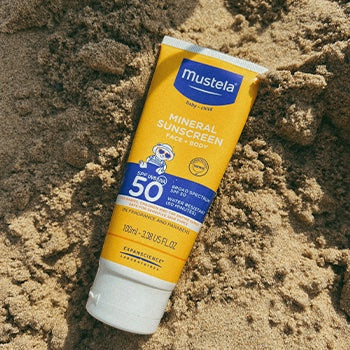
SPF 50 Mineral Sunscreen Lotion is a protective and hydrating sunscreen made with 93% ingredients of natural origin per ISO 16128 standard, including coconut oil, macadamia oil, and Vitamin E. The lightweight texture blends easily into your skin and doesn’t leave that dreaded white cast.
It’s broad-spectrum, free of questionable chemical ingredients, and safe for both the face and body of little ones and adults alike.
SPF 50 Mineral Sunscreen Stick

For a slim sunscreen stick that’s perfect for travel, turn to our SPF 50 Mineral Sunscreen Stick. Packed with 70% ingredients of natural origin per ISO 16128 standard including shea butter, avocado oil, sunflower seed oil, and jojoba, this sunscreen offers effective sun protection without any unnecessary nasties.
In addition to acceptance by the National Eczema Association, this sunscreen proudly wears the National Science Foundation (NSF) quality seal.
Travel-friendly and oh-so-natural, it’s the perfect sunscreen stick to bring when you’re on a hike or at the beach, pool, or lake.
SPF 30 Mineral Sunscreen Spray

If you prefer a spray sunscreen for eczema-prone skin, there’s an option for you, too. Our SPF 30 Mineral Sunscreen Spray has all the benefits of mineral sunscreen in a quick and painless spray bottle so your family can get back to enjoying fun in the sun as soon as possible!
The aloe vera, calendula, chamomile flower extract, and sunflower oil soothe and hydrate while protecting your family’s skin from the sun’s rays. And if you need a little more protection, choose SPF 50 Mineral Sunscreen Spray.
Don’t Stop At Sunscreen
Sunburn can be itchy and sore for everyone, but for those with already sensitive, eczema-prone skin, it can quickly become a nightmare!
And spending too much time in the sun can increase your risk of skin cancer and early skin aging. Of course, prevention is key when it comes to sunburn. That’s where sunscreen comes in. But don’t stop there!
In addition to the other advice we’ve shared, follow these tips to protect yourself and your family:
- Limit time in the sun, especially during peak hours (10 a.m. to 2 p.m.)
- Wear protective clothing, such as long-sleeved shirts, pants, hats, and sunglasses
- Seek shade when possible
That said, we know things happen and you may not always be able to adhere to the tips above. If you or your little one happens to catch too much sun, it’s important to know how to treat it.
In addition to cool baths and extra hydration, it’s a good idea to have an after-sun product on hand just in case your little one needs natural relief from symptoms. Look for naturally soothing ingredients, like aloe vera.
Caring For Eczema-Prone Skin In The Summer
Finding the perfect sunscreen for eczema-prone skin is an essential part of a safe and fun summer. But between sweating and overheating, summer can be a challenging time for those with eczema.
Here are a few additional tips to help you beat the hot days:
- Hydrate from the inside out by drinking plenty of water
- Stay cool and limit time outside during the hottest part of the day
- Run a humidifier in your house if the air is dry
- Wear loose, cotton clothing
- Make your baby’s bathtime skin-soothing with special products
Get Outdoors With The Right Sunscreen For Eczema!

Choosing the best sunscreen for eczema-prone skin doesn’t have to be difficult!
Remember to avoid harmful chemicals, choose mineral ingredients, look for a broad-spectrum sunscreen as well as the right SPF, and ensure your selection is water- and sweat-resistant for optimum sun protection.
When it comes to protecting eczema-prone skin from the sun’s harsh rays, you can’t go wrong with Mustela’s range of sun protection products — all of which are certified by the NEA and formulated with non-nano zinc oxide.
From our SPF 50 Mineral Sunscreen Lotion to our SPF 50 Mineral Sunscreen Stick, we’ve got your family covered so you can safely enjoy your time in the sun knowing you’re all protected!



